★★
“Falls off.”
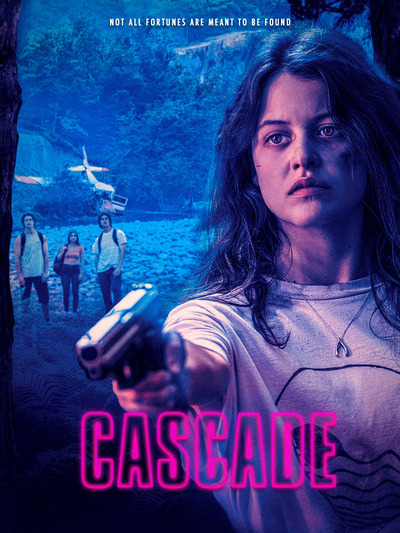 It’s kinda interesting to compare this to Mercy Falls. Both concern an ill-fated trip into a scenic wilderness – all trees and waterfalls – by a group of friends, which goes increasingly off the rails. The main difference is, in Mercy, the call was coming from inside the house, as it were. Here, the threat is definitely external. The target is four friends, just finished high school and about to enter the world at large. Jesse (Oulette) will work as a mechanic; his girlfriend Alex (Waisglass) wants to leave their small town and go to college, but hasn’t plucked up the courage to tell Jesse yet. Making matters more complex, her father is part of the Dark Saints, a biker gang and generally criminal enterprise.
It’s kinda interesting to compare this to Mercy Falls. Both concern an ill-fated trip into a scenic wilderness – all trees and waterfalls – by a group of friends, which goes increasingly off the rails. The main difference is, in Mercy, the call was coming from inside the house, as it were. Here, the threat is definitely external. The target is four friends, just finished high school and about to enter the world at large. Jesse (Oulette) will work as a mechanic; his girlfriend Alex (Waisglass) wants to leave their small town and go to college, but hasn’t plucked up the courage to tell Jesse yet. Making matters more complex, her father is part of the Dark Saints, a biker gang and generally criminal enterprise.
This matters, because the Dark Saints just lost a shipment of drugs, the plane carrying it having crashed in a remote region of a nearby national park. Their minions are on the hunt for it, but – what are the odds? – Alex and her friends are first to stumble across it. A discussion ensues about what to do, but it’s all rendered moot after they cross paths with the minions. Before you can say, “implausible plot line,” Jesse has broken his leg and he, plus another of the quartet, pregnant pal Em (Laflamme-Snow) have been captured by the bad guys. It’s up to Alex to figure out what to do, as the only member of the group left able to operate freely.
Which is fortunate, since she’s also the smartest of the people wandering in the woods, and it’s not even close. Let’s just say, pond life would likely rate second or third place among these people, and I’m including both the hikers and the minions in those rankings. Seeing her mental wheels spinning as she out-thinks and outmanoeuvres her enemies is one of the few pleasures this offers. But it’s like watching a grand master playing chess against a pigeon. The only genuine and credible threat is her Dad and the Dark Saints, and they don’t show up until the very end of proceedings. With Alex’s witless friends, dumb and/or unlikable, the ones in peril, the stakes here aren’t enough to engage the viewer either.
I will say, the film does look half-decent, with Diego Guijarro’s cinematography popping nicely off the screen, and the Canadian backdrop is scenic. But too often, the film pulls its punches, whether it’s a character leaping off the waterfalls, depicted with them simply vanishing out of sight, or a pivotal car crash in which it appears no vehicles were actually harmed. This might as well be a TVM, with only the potty-mouths of some inhabitants meriting more than a PG rating. It’s all blandly innocuous, and despite Waisglass’s best efforts, it never gels. Things like Em’s pregnancy, for instance, feel like an afterthought, which goes nowhere and seems like nothing more than a cheap ploy to get audience sympathy. Memo to the film-makers: it didn’t work.
Dir: Egidio Coccimiglio
Star: Sara Waisglass, Joel Oulette, Sadie Laflamme-Snow





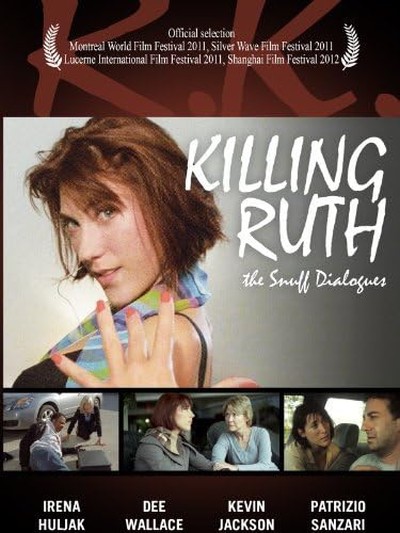 As soon as I saw the running time of this was one hundred and thirty-one minutes, it immediately went onto the back-burner. I have a busy life, and I’ve going to devote close to two and a quarter hours to a low-budget movie, it is going to be when I have a
As soon as I saw the running time of this was one hundred and thirty-one minutes, it immediately went onto the back-burner. I have a busy life, and I’ve going to devote close to two and a quarter hours to a low-budget movie, it is going to be when I have a  Mildred Moyer (Chamberlain) has a problem, and it’s as plain as the nose on her face. Actually, it
Mildred Moyer (Chamberlain) has a problem, and it’s as plain as the nose on her face. Actually, it  I was going to start this with a warning to try and avoid reading other reviews of this before watching it, because it felt as if, without exception, they all included spoilers for a significant plot-point, that wasn’t actually revealed until deep into the movie. Heck, the IMDb synopsis does it too. However, having sat through the entirety of this bland piece of indigenous folk pseudo-horror, all I can say is “Meh.” You do you: it’s probably not as if it’s going to have much impact, because it’s hard to spoil something which already smells past its best before date.
I was going to start this with a warning to try and avoid reading other reviews of this before watching it, because it felt as if, without exception, they all included spoilers for a significant plot-point, that wasn’t actually revealed until deep into the movie. Heck, the IMDb synopsis does it too. However, having sat through the entirety of this bland piece of indigenous folk pseudo-horror, all I can say is “Meh.” You do you: it’s probably not as if it’s going to have much impact, because it’s hard to spoil something which already smells past its best before date. When I reviewed Russian fencing film
When I reviewed Russian fencing film 
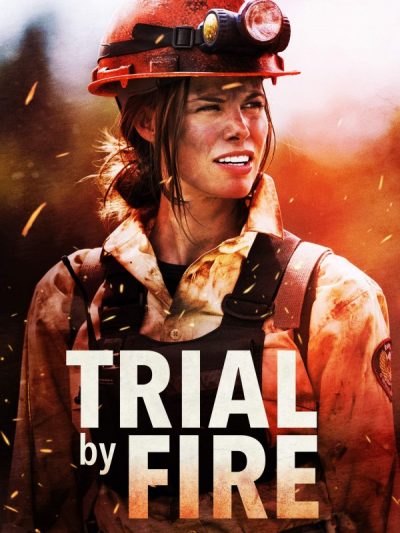
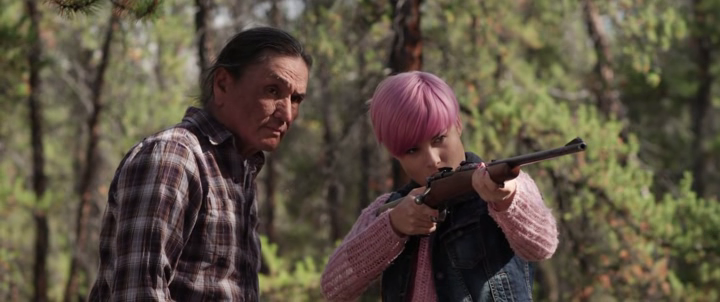 While certainly more relaxed that many of the films we cover here, this makes it in on the strength of its heroine’s character arc. That belongs to Lia (Jacobs), a teenage girl in the Northwest Territories of Canada, who is being raised by her father. When he has to go off for work, she gets sent north of the Arctic Circle to live with her grandmother (Jerome) for the nightless summer. She hates the rural life, and runs away, stealing a boat in the hope of reaching Dawson City, the nearest big town – not realizing it would be four weeks journey. She falls overboard after her boat breaks down, and is lucky to be rescued by Alfred (Howard), a hunter from the local Gwich’in tribe. As they cross the remote wilderness, she begins to appreciate it, bonding with the thoroughly down-to-earth Alfred and learning from him – wolves hate the smell of tobacco, apparently. But when an accident befalls her guide, Lia is going to have to dig into her own resources.
While certainly more relaxed that many of the films we cover here, this makes it in on the strength of its heroine’s character arc. That belongs to Lia (Jacobs), a teenage girl in the Northwest Territories of Canada, who is being raised by her father. When he has to go off for work, she gets sent north of the Arctic Circle to live with her grandmother (Jerome) for the nightless summer. She hates the rural life, and runs away, stealing a boat in the hope of reaching Dawson City, the nearest big town – not realizing it would be four weeks journey. She falls overboard after her boat breaks down, and is lucky to be rescued by Alfred (Howard), a hunter from the local Gwich’in tribe. As they cross the remote wilderness, she begins to appreciate it, bonding with the thoroughly down-to-earth Alfred and learning from him – wolves hate the smell of tobacco, apparently. But when an accident befalls her guide, Lia is going to have to dig into her own resources. This falls victim to the Spielberg Effect. By that, I mean, that any movie directed by Steven Spielberg will inevitably become the yardstick by which future entries of that kind are judged – typically, unfavourably. Killer shark films will be compared to Jaws. Holocaust epics to Schindler’s List. And the genre of movies in which drivers are menaced by unseen truck drivers? Expect comparisons to Duel. And in this case, they are entirely warranted. I guess if you’ve never heard of Duel, this might just pass muster. But you would still be better off watching it, than this lame imitation, which has a nice car (a Mustang) and some lovely scenery (I’m guessing Canadian). That’s all it can offer though.
This falls victim to the Spielberg Effect. By that, I mean, that any movie directed by Steven Spielberg will inevitably become the yardstick by which future entries of that kind are judged – typically, unfavourably. Killer shark films will be compared to Jaws. Holocaust epics to Schindler’s List. And the genre of movies in which drivers are menaced by unseen truck drivers? Expect comparisons to Duel. And in this case, they are entirely warranted. I guess if you’ve never heard of Duel, this might just pass muster. But you would still be better off watching it, than this lame imitation, which has a nice car (a Mustang) and some lovely scenery (I’m guessing Canadian). That’s all it can offer though.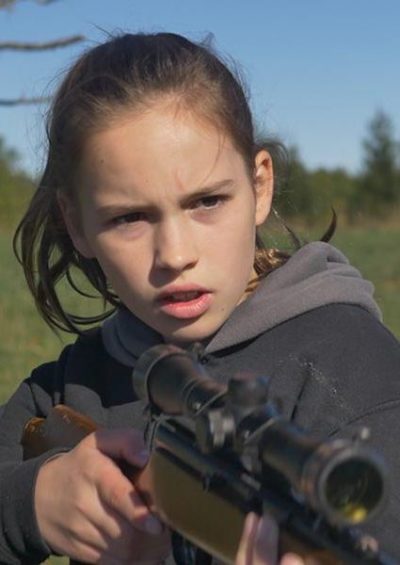 Really, for a reported budget of about $6,500 – and those are Canadian dollars, which currently works out to less than five grand in freedom dollars – this is quite impressive. You could argue that trying to create a convincing post-apocalyptic scenario on such a tiny budget is biting off more than you can chew. And there are certainly moments which just don’t work. But in its low-key approach, it’s probably a more accurate reflection than many of the way in which the world might end. Not with a bang, but with a whimper, and a slow grinding to a halt.
Really, for a reported budget of about $6,500 – and those are Canadian dollars, which currently works out to less than five grand in freedom dollars – this is quite impressive. You could argue that trying to create a convincing post-apocalyptic scenario on such a tiny budget is biting off more than you can chew. And there are certainly moments which just don’t work. But in its low-key approach, it’s probably a more accurate reflection than many of the way in which the world might end. Not with a bang, but with a whimper, and a slow grinding to a halt.